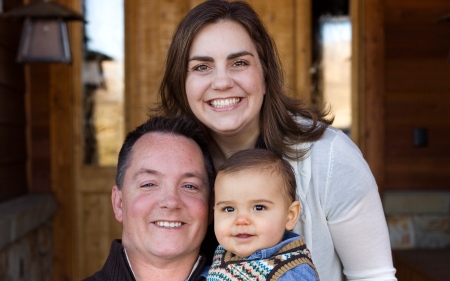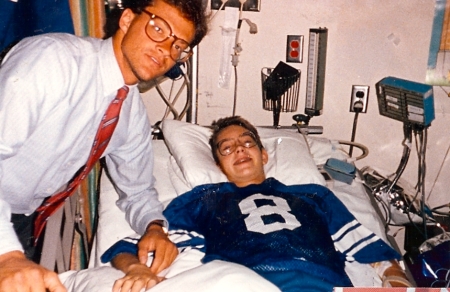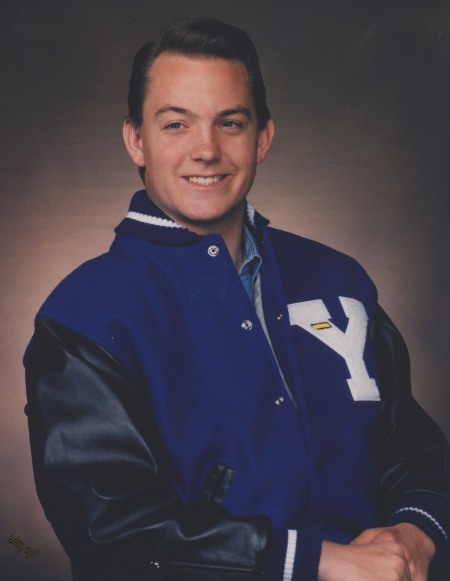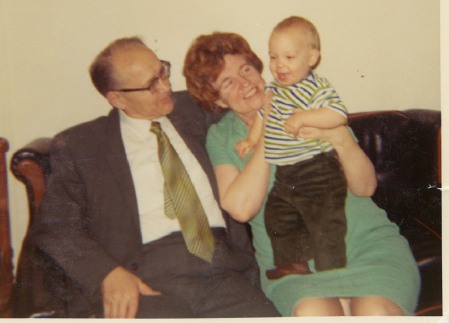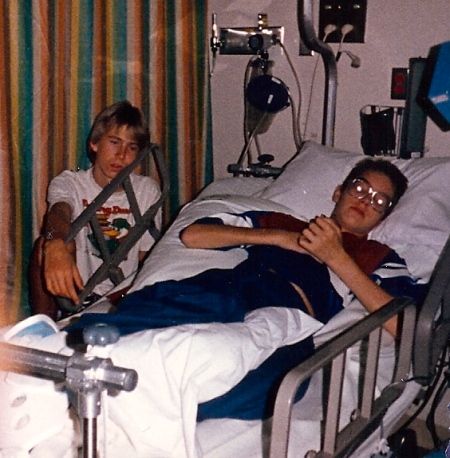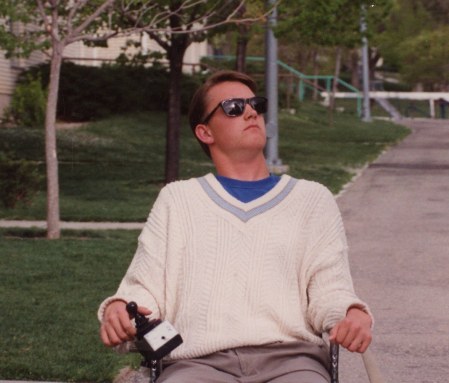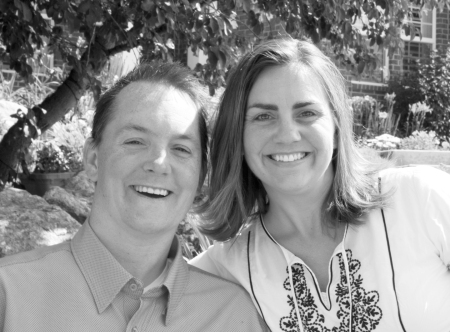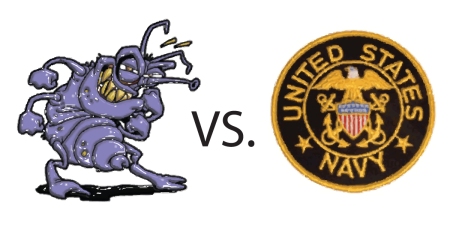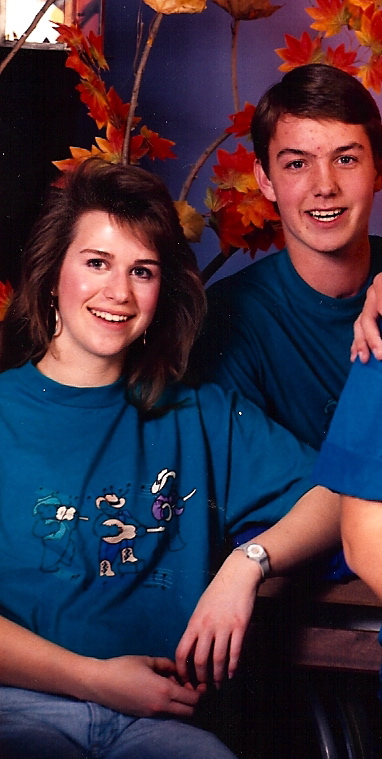
Karen Dahlstrom and I at Borah High School's Harvest Hop Dance (1987)
Before my diving accident caused me to be a quadriplegic, I loved to dance. From my 14th birthday to the day I broke my neck the social event of my life was the Saturday Night Dance, more commonly known as the SND.
The SND was a regional dance that was held every Saturday. There were few things I looked forward to during that time of my life like I looked forward to the SND. In fact, the greatest punishment my parents could excise in those years was to “ground” me from the dance.
I seem to remember many Saturdays when, late in the afternoon, my dad would ask me if I had completed my chores (in particular, if I had mowed the lawn) where my answer in the negative brought out the threat of missing the dance. Too many times, without enough hours to do the job right, I would run behind the lawnmower as it bounced up and down in front of me. Big, huge pieces of lawn were missed completely. But, by the time I asked my dad to check if the lawn had been completed, it was dark and I was free to go. I remember just as vividly the Sunday mornings that followed when my dad realized my work was shoddy and I was sternly invited to mow the entire lawn again on Monday. Although the repercussions were never fun, the payoff of the SND was always worth it.
One might imagine then the concern I had when I returned home from the hospital paralyzed from the chest down. I didn’t know if you could dance in a wheelchair. I had never seen it done. I didn’t even know if I could date in a wheelchair. So, fearful to try, I did my best to stay away from dating and dancing completely.
I returned to school from the hospital in October. In the beginning, I only had the strength and ability to attend a few classes. It wasn’t until well into that sophomore year that I was able to take anything even close to a full load. My absence from school made easier to stay absent from dancing and dating. I benefited from a kind of, “out of sight, out of mind” situation.
My junior year was different. First, I was attending school full-time. My health allowed me not only to be more present during the school day but that extra curricular activities as well. I started to become more involved in student government and was elected junior class president. I was a regular fixture at the athletic events.
This all made for a social calendar more full than I had ever hoped. But, it also made it difficult to stay away from the dating and dancing that scared me so.
I had been to a dance before and before I could even catch my breath and get comfortable as a wallflower, one of the chaperones took me out on the floor and began moving my manual wheelchair back and forth “dancing” for me. This might have been a good idea for some people who were in chairs and although I knew his heart was in the right place, I was mortified and felt more disabled; not less. Within literal minutes I found my ride and convince them to take me home. I wasn’t there long enough for it to count as attending a dance. I was barely there long enough for it to count as listening to a song.
If this experience did anything it made me more nervous and frightened about attending a full dance not to mention a “date dance” and taught me that unless I wanted someone to dance for me (embarrassing me to no end) I was going to have to figure out how to dance for myself. Try as I might I couldn’t figure out a way to resolve the problem with an answer that resulted in me dancing in a way that looked or felt comfortable at all.
My first real hurdle was Homecoming.
As a junior class officer I had some responsibility with reference to the activities that went on during the week, including the dance. This, coupled with my other involvement prompted a lot of questions about my plans for the Homecoming dance.
Somewhere around the middle of September my friends started asking, “Who are you taking to the dance?”
I had to be very careful about how I answered that question. My friends had decided that they were not going to treat me any different because I was in a wheelchair. They refused to accept excuses that had to do with my disability. In fact, if I was ever trying to get them to buy into an excuse bringing up my disability would only ever hurt my chances, not help them.
I knew that if I were I to tell them that I wasn’t going to the dance because I was unsure of how to date or dance in a wheelchair, not only would they never accept that excuse but, it would most likely prompt them to respond by showing up at my home the night of the dance, coming down to my room, lifting me out of bed in my pajamas, throwing me into the car and introducing me to my date; who would surely be the easiest girl they could find on short notice–Probably some lady standing just off the on-ramp near my house holding a sign saying, “Will work for food.”
As nervous and scared as I was to attempt any real dancing in a wheelchair, their potential response scared me even more. It was for this very reason that when they asked me who I was taking to dance I told them that unfortunately I was going to be out of town. This answer seemed to appease them, and the subject was dropped.
On the night of the Homecoming dance I took my power wheelchair and drove to Meridian from Boise. For those people who know the area this is not a long trip. In fact, the journey took about two and a half minutes… round trip… on my elbows. I could essentially spit to Meridian from my house. But, this way my excuse held up without necessitating a lie, for I was “technically” out of town.
The dance was on a Saturday night. At school, on the Monday that followed, everyone was talking about the dance. They were laughing and joking already nostalgic about the fun and good times they had. A few days later the photographer that took the pictures at the dance came to school to deliver the portraits. I remember sitting in the hall watching everyone carry around the black cardboard frames that carried the photos from the dance.
I wanted to be carrying one of those frames so bad I could hardly see straight. I didn’t even care if I was in the picture. I just wanted to be included. I didn’t want to be the only one without photographs and memories from the dance. Worse still my heart wanted to be dating and dancing, but my fear kept me both in check and at home.
The next “date” dance at my school was called the “Harvest Hop”–a kind of a Sadie Hawkins dance. Like most dances of its kind, it was a “girl ask guy” evening where tradition held that in addition to the traditional responsibilities of the dance the girl would also buy matching shirts. This way the couple would be what they called in the vernacular of the day “twinners.”
I was quite sure that I was safe. I hadn’t really done any dating since my accident or dancing in a wheelchair and figured that the girls at my school would see me simply not an option.
A few days later, as I pulled into my driveway on my way home from school, I noticed a big basket on my doorstep. I don’t remember exactly what was in the basket, but knowing the way teenage girls went about asking teenage boys to dances at my high school, I am sure that it was filled with balloons you had to pop, to find puzzle pieces that you put together, to make a map, that took you on a scavenger hunt, that required two days and a pup tent, which eventually led to a box of Cheerios, that had to be emptied out, in order to find the one specific Cheerio, that had been dyed green, and had the invitation to the dance inscribed around its side.
I went through the steps required to figure out what I was being asked to and who was doing the asking. When I figured out I was being asked to the “Harvest Hop” by a cute girl, my brain went into overdrive and I immediately told Karen that I would go to the dance.
Minutes after giving Karen my answer I heard a little voice in my head that screamed, “YOU DON”T KNOW HOW TO DANCE!” In an instant all of the fear that my excitement had skipped over came back in a flood that made Noah’s look like a puddle. I knew I had to do anything and everything I could to get out of this dance.
A few days later I found out that Karen had purchased short sleeve “twinner” shirts for us to wear to the dance. I went up to her and explained that since the dance was in November, short sleeve shirts would be too cold, and we should therefore not go to the dance.
I went into our discussion with what I felt like was a good, well thought out argument. However, like most arguments I have had with women in my life, we talked for a little while and as I left the conversation I realized that for reasons I can hardly explain, we were still going to the dance.
Every week we went through the same exercise. I came up with a good argument that seemed airtight and indestructible, we would talk for a while and at the end of the conversation were still going to the dance. Finally, the dance was only a few days away and I needed to find an out.
I found Karen in the hallway, stopped her and with all the power, and strength I could muster said, “Let’s just not go.” She returned my gaze with one that told me I had much to learn about power and strength and said, “Jason, shut up and go.” Not wanting any part of anything she was about to reign down upon me I replied, “Yes ma’am.”
The night of the dance I was a nervous wreck. I was unsure of so many things. My handicap accessible van had not yet been converted and so I was unable to drive. This meant Karen was going to not only transport us to and from the activities she had planned for the evening, but it also meant she was going to have to lift me in and out of the car to attend those activities. I had heard that we are going the dinner like a picnic in a barn. I was just learning how to eat without the aid of my special utensils and I was unsure how I was going to do that in front of a group and without table. Not to mention having no idea how I was going to actually dance in my wheelchair.
Karen pulled into my driveway in her cute little Toyota Tercel. Unfortunately, the trunk wasn’t large enough to fit my wheelchair, so she had to go home and get her mom’s Country Squire Station Wagon. It wasn’t a car, it was an event. It felt like it took four blocks just a parallel park this thing.
They loaded up my chair, and my dad taught Karen how to get me in and out of the passenger seat of the station wagon and we were off. The first half of the night went relatively well and after dinner we ended up at the dance. We went into the dance and there is a huge long line waiting to get their pictures taken. Karen suggested that we go into the dance and wait until the line for pictures became a little shorter. I said no, hoping that the line for pictures would be long enough that by the time the pictures were actually taken the dance would be over.
We finally reached the photographer, had our pictures taken, and there was plenty of dance left.
As we came on the dance floor the first song was a fast song. I had no idea what to do and so I started to mock what we called the seventh-grade shuffle (because it’s the way all the seventh graders who have no idea how to dance; dance.) Everyone’s familiar with it, for everyone’s not only seen it they’ve actually done it. In essence the “shuffle” is clumsily moving back and forth trying to find the rhythm while you clap your hands.
Although “the shuffle” got me through the first song, by the time the second song was playing my confidence was increasing as was my ability to move with the beat. I started to get a little more aggressive on the dance floor.
I was “feelin’ the groove” and “gettin’ down” by the time the third song had begun. In the middle of the fourth song the spotlights were shining on me, and in my best John Travolta imitation I took off my jacket threw it into the crowd and began pointing my arm up and down thinking, “Stayin’ Alive, Stayin’ Alive!” All of the people at the dance and circle around me and clapping in unison were chanting, “Go Jason! Go Jason!” (O.K. that maybe a little of an exaggeration. Let’s just say I was having a good time.)
Then, it happened. The DJ put on a slow song. If I was unsure about how to dance to a fast song I had no idea what to do with a slow one. I remember thinking, “Punch bowl, get to the punch bowl.” I turned that little wheelchair of mine around and started doing what felt like warp eight for the refreshment table.
Just then, Karen grabbed the back of my wheelchair, spun me around, jumped on my lap, put her arm around me, and said, “let’s dance.”
It was the first time since my accident that I saw my friends wishing day to were quadriplegics. Instantly, they were trying to figure out how they could get their dates to sit on their laps as well. The slow song was over and I felt like seat belting Karen into my chair and asking her if we could dance all the dances like this. Later, talking to my friends at the refreshment table I could see that they were dying to ask if they can borrow my chair for a dance.
The dance finally ended and Karen took me home. I had a wonderful time. It was better than I ever could have hoped for. Somehow, someway she helped me get into the groove.
The real lesson in this story comes when we ask ourselves, “Why?” Why was Karen willing to go through so much grief to take me to the dance.
I was far from the easiest date. It has to take some of the enjoyment away from the experience when leading up to the dance your date is, for the most part, scheming to find a way out of going.
In a time like high school when status is everything and everything defined status, she didn’t get to drive the coolest car to the dance. Instead of her little Tercel she was forced to take the family station wagon. Although my wheelchair fit in the back of the car, there was also enough room for the band, the band’s equipment, the refreshments, the refreshment table, and everyone at the dance. It felt like there was more room in the car than there was in the gym.
In addition, not many ladies like the whole process of asking fellas on dates in the first place, let alone having to lift them in and out of the car along the way. Karen had to lift me in the car at the house, out of the car at the place we ate dinner, back into the car after dinner, out of the car when we arrived at the school for the dance, and back into the car after the dance. Not only was is a lot of work, it was probably a little uncomfortable as well.
I wasn’t the most popular or best looking kid at my school. I’m quite sure there weren’t any students camped out at the school’s entrance wondering, “Who gets to take Jason Hall to the dance.”
But Karen cared. She cared more about me and my experience and she did about all the rest of that stuff. The fact that I went to the dance was more important than status or popularity, and because it was my life became different.
With absolutely no hyperbole I can say that she changed my life. She showed me that I could find a way to dance without a chaperone’s help. To Karen’s credit I never missed another dance during high school or college.
To some that may seem a small thing. But to me, trying to find my way, it meant the whole world and helped me continue to have the courage to be involved the same way I was before my injury.
Like Karen, everyday we have the opportunity to make sweeping differences in the lives of others. But we can’t just see those opportunities and not act. We have to do something to make a change. We have to do something to make a difference. Most often, it doesn’t take much. Most of the time, it simply takes the willingness to care more about others than we do about ourselves. For the most part, it takes thinking as much about others’ feelings then we do about our own status, popularity or other trivial, meaningless, earthly treasures.
Doing this, like Karen, we can encourage others to live differently. We can teach people to do things they previously thought undoable. It might take a little discomfort or a little sacrifice. It will definitely take a lot of cheering and support. But when we’re finished we’ll leave them with a sense of belonging.
Often, the greatest gift we can ever give is to help others feel comfortable, be accepted and allow them to get into the groove.
Jh-
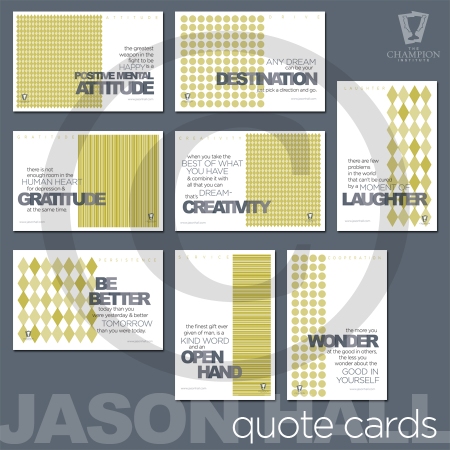



 Posted by Jason Hall
Posted by Jason Hall 